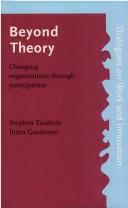| Listing 1 - 10 of 27 | << page >> |
Sort by
|
Book
ISBN: 9781786352392 1786352397 1786352400 9781786352408 Year: 2017 Publisher: Bingley, England : Emerald Group Publishing Limited,
Abstract | Keywords | Export | Availability | Bookmark
 Loading...
Loading...Choose an application
- Reference Manager
- EndNote
- RefWorks (Direct export to RefWorks)
Within the labor relations paradigm, employee voice is broadly defined as the ways and means through which employees have a say and influence organizational issues at work. Whilst we know much about employee voice in the Anglo-American (developed) world, we know much less about how employee voice operates in emerging economies. This volume explores the nature of employee voice in four emerging economies: Argentina, China, India and South Korea. The volume brings together an internationally renowned group of contributors who are experts in their field and an authority on their countries, to combine cutting edge research and theory in this essential exploration of voice in emerging economies.This volume identifies, inter alia, novel forms and channels of employee voice, new institutional and informal actors, new challenges to social dialogue and representation in emerging economies, and, the importance of cultural norms in predicting employee voice behaviors. The volume therefore provides a timely challenge to the predominant assumptions that underline the nature, operation and effectiveness of employee voice in the Western world.
E-books --- Management --- Communication in industrial relations --- Comparative industrial relations --- Employee participation --- Labor mobility --- Industrial relations --- Administration --- Organization --- Business & Economics --- Industrial relations. --- Labor. --- Employee participation. --- Autogestion (Employee self-management) --- Codetermination, Worker --- Consultative management --- Economic democracy --- Employee involvement in management --- Employee participation in management --- Employees' representation in management --- Industrial democracy --- Labor participation in management --- Participative management --- Participatory management --- Self-management by employees --- Worker codetermination --- Worker participation in management --- Worker self-management --- Workers' control --- Workers' participation in management --- Workers' self-management --- Employee ownership --- Producer cooperatives
Book
ISBN: 1869226798 186922678X 9781869226794 9781869226787 Year: 2017 Publisher: Randburg KR Publishing
Abstract | Keywords | Export | Availability | Bookmark
 Loading...
Loading...Choose an application
- Reference Manager
- EndNote
- RefWorks (Direct export to RefWorks)
Management --- Organizational effectiveness --- Ability --- Value added --- Added value --- Manufacturing processes --- Abilities --- Aptitude --- Proficiency --- Skill --- Skills --- Talent --- Talents --- Expertise --- Organization --- Autogestion (Employee self-management) --- Codetermination, Worker --- Consultative management --- Economic democracy --- Employee involvement in management --- Employee participation in management --- Employees' representation in management --- Industrial democracy --- Labor participation in management --- Participative management --- Participatory management --- Self-management by employees --- Worker codetermination --- Worker participation in management --- Worker self-management --- Workers' control --- Workers' participation in management --- Workers' self-management --- Industrial relations --- Employee ownership --- Producer cooperatives --- Employee participation --- E-books

ISBN: 9027217726 9786613327871 1283327872 9027276161 9789027276162 9781556198267 1556198264 1556198264 9789027217721 Year: 1996 Publisher: Amsterdam Philadelphia J. Benjamins Pub.
Abstract | Keywords | Export | Availability | Bookmark
 Loading...
Loading...Choose an application
- Reference Manager
- EndNote
- RefWorks (Direct export to RefWorks)
Action Research is one of the most practical and down-to-earth ways of doing research into working life. Beyond Theory draws on examples and actual cases to discuss action research within the framework of the modern, and postmodern, theory of science debate. While action research has been much criticized by the traditionalists, the book reflects a convergence between action research and positions emerging out of the critique of scientific traditionalism. Discussions between these two fields of knowledge, originally so very different, can enrich both. The book will be useful not only to
Action research. --- Management -- Employee participation. --- Management. --- Organizational change. --- Organizational change --- Action research --- Management --- Business & Economics --- Management Styles & Communication --- Employee participation --- Employee participation. --- Autogestion (Employee self-management) --- Codetermination, Worker --- Consultative management --- Economic democracy --- Employee involvement in management --- Employee participation in management --- Employees' representation in management --- Industrial democracy --- Labor participation in management --- Participative management --- Participatory management --- Self-management by employees --- Worker codetermination --- Worker participation in management --- Worker self-management --- Workers' control --- Workers' participation in management --- Workers' self-management --- Social action --- Change, Organizational --- Organization development --- Organizational development --- Organizational innovation --- Research --- Industrial relations --- Employee ownership --- Producer cooperatives --- Social sciences --- Organization --- Manpower planning

ISBN: 1882197682 9786611001230 111815441X 1281001236 1932973141 1118155173 9781118155172 9781281001238 9781118154410 9781932973143 Year: 2001 Publisher: Greensboro, N.C. : Center for Creative Leadership,
Abstract | Keywords | Export | Availability | Bookmark
 Loading...
Loading...Choose an application
- Reference Manager
- EndNote
- RefWorks (Direct export to RefWorks)
Team success doesn't start with results. It starts with the building of an effective team that can deliver on its promise. This book is for managers and leaders who have responsibility for the creation and success of teams. If you are a department head or project manager, or if you are the senior-level champion or sponsor of a proposed team, this guidebook will help you understand the five factors critical to building effective teams and show you how to use those factors to lay the groundwork for successful teams.
Teams in the workplace. --- Management --- Employee participation. --- Groups, Work --- Team building in the workplace --- Team work in the workplace --- Teambuilding in the workplace --- Teams, Work --- Teamwork in the workplace --- Work groups --- Work teams --- Autogestion (Employee self-management) --- Codetermination, Worker --- Consultative management --- Economic democracy --- Employee involvement in management --- Employee participation in management --- Employees' representation in management --- Industrial democracy --- Labor participation in management --- Participative management --- Participatory management --- Self-management by employees --- Worker codetermination --- Worker participation in management --- Worker self-management --- Workers' control --- Workers' participation in management --- Workers' self-management --- Social groups --- Work environment --- Industrial relations --- Employee ownership --- Producer cooperatives
Book
ISBN: 1781907501 1306291224 178190751X 9781781907511 9781781907504 Year: 2013 Publisher: Bingley, U.K. Emerald
Abstract | Keywords | Export | Availability | Bookmark
 Loading...
Loading...Choose an application
- Reference Manager
- EndNote
- RefWorks (Direct export to RefWorks)
Ownership and decision-making are key issues in the economic restructuring taking place as economies struggle to emerge from the Great Recession, and technological change and globalization continue to place new demands on workers and firms. Corporate, labor, and policy leaders are increasingly recognizing the potential role of employee ownership, cooperatives, profit sharing, and other ways in which employees directly participate in decision-making and financial performance. This volume contains cutting-edge research on the causes and effects of financial and decision-making participation, including results from the United States, European Union, Russia, India, and Basque area of Spain, along with a unique laboratory experiment to probe the real-world findings. Along with consideration of standard economic outcomes are studies that examine job satisfaction in the largest U.S. worker cooperative, and firm survival among cooperatives and ESOP companies. In addition, there are theoretical and thought pieces on the meaning and value of employee ownership in a rapidly changing world economy.
Business & Economics --- Labor & Workers' Economics --- Profit-sharing. --- Management --- Employee participation. --- Autogestion (Employee self-management) --- Codetermination, Worker --- Consultative management --- Economic democracy --- Employee involvement in management --- Employee participation in management --- Employees' representation in management --- Industrial democracy --- Labor participation in management --- Participative management --- Participatory management --- Self-management by employees --- Worker codetermination --- Worker participation in management --- Worker self-management --- Workers' control --- Workers' participation in management --- Workers' self-management --- Deferred profit sharing plans --- Profit sharing plans --- Industrial relations --- Employee ownership --- Producer cooperatives --- Employee fringe benefits --- Incentives in industry --- Wages --- Cooperation --- Employee participation --- E-books --- Accounting. --- Finance & accounting. --- Accounting --- General. --- Managerial.
Book
ISBN: 1785603787 1785603795 9781785603785 9781785603792 Year: 2015 Publisher: Bingley, U.K. Emerald
Abstract | Keywords | Export | Availability | Bookmark
 Loading...
Loading...Choose an application
- Reference Manager
- EndNote
- RefWorks (Direct export to RefWorks)
Alternative types of ownership and participatory managerial practices have recently been intensively debated. The great recession has revived interest in cooperative and labor-managed organizations. In addition, employee participation in decision-making and financial performance has consistently attracted attention during the last 20 years. The articles in this volume contribute to both of these topics. The first set of articles studies the relationship among business cycles, alternative forms of ownership, and employee voice. These papers take various theoretical and empirical approaches and investigate many industries and countries. They show how the economic downturn is leading to increased incidence of employee ownership but also undermining employee voice by increasing the incidence of atypical employment. The second set of papers looks inside firms. The topics include the relationship between ownership and innovation and how financial participation and group incentives affect employee attitudes and work effort. The contributions in this volume provide stimulating research in the broad area of participatory and labor-managed organizations.
Labor & Workers' Economics --- Business & Economics --- Management --- Employee empowerment. --- Employee participation. --- Empowerment, Employee --- Autogestion (Employee self-management) --- Codetermination, Worker --- Consultative management --- Economic democracy --- Employee involvement in management --- Employee participation in management --- Employees' representation in management --- Industrial democracy --- Labor participation in management --- Participative management --- Participatory management --- Self-management by employees --- Worker codetermination --- Worker participation in management --- Worker self-management --- Workers' control --- Workers' participation in management --- Workers' self-management --- Delegation of authority --- Industrial relations --- Employee ownership --- Producer cooperatives --- Employee participation --- Employee empowerment --- E-books --- Labour economics. --- Labor.

ISBN: 0415607949 1315016877 113651869X 0415313821 1299995977 9781136518690 9781315016870 9780415313827 0415313791 9781136518768 9781136518836 9780415607940 1136518762 Year: 2003 Publisher: London
Abstract | Keywords | Export | Availability | Bookmark
 Loading...
Loading...Choose an application
- Reference Manager
- EndNote
- RefWorks (Direct export to RefWorks)
Covering the role of trades unions and labour organizations in industrial relations, Industry's Democratic Revolution contains case studies from Austria, Canada, France, Germany, Israel, Norway, Sweden, Switzerland, the UK and USA. Each chapter is authored by a President or Secretary General of one of the largest industrial unions from that particular country, which gives an unparalleled insight into the workings of unions and their participation in the key issues of industrial relations such as:
* Productivity factors
* Guaranteed wages
* Union participation in management de
Management --- Industrial sociology. --- Labor unions. --- Employee participation. --- Industrial unions --- Labor, Organized --- Labor organizations --- Organized labor --- Trade-unions --- Unions, Labor --- Unions, Trade --- Working-men's associations --- Autogestion (Employee self-management) --- Codetermination, Worker --- Consultative management --- Economic democracy --- Employee involvement in management --- Employee participation in management --- Employees' representation in management --- Industrial democracy --- Labor participation in management --- Participative management --- Participatory management --- Self-management by employees --- Worker codetermination --- Worker participation in management --- Worker self-management --- Workers' control --- Workers' participation in management --- Workers' self-management --- Labor movement --- Societies --- Central labor councils --- Guilds --- Syndicalism --- Sociology --- Industrial organization --- Industries --- Industrial relations --- Employee ownership --- Producer cooperatives --- Social aspects
Book
ISBN: 3110885425 9783110885422 Year: 2017 Publisher: Berlin Boston
Abstract | Keywords | Export | Availability | Bookmark
 Loading...
Loading...Choose an application
- Reference Manager
- EndNote
- RefWorks (Direct export to RefWorks)
Corporate culture. --- Employee motivation. --- Management --- Employee participation. --- Autogestion (Employee self-management) --- Codetermination, Worker --- Consultative management --- Economic democracy --- Employee involvement in management --- Employee participation in management --- Employees' representation in management --- Industrial democracy --- Labor participation in management --- Participative management --- Participatory management --- Self-management by employees --- Worker codetermination --- Worker participation in management --- Worker self-management --- Workers' control --- Workers' participation in management --- Workers' self-management --- Industrial relations --- Employee ownership --- Producer cooperatives --- Motivation in industry --- Work motivation --- Motivation (Psychology) --- Personnel management --- Psychology, Industrial --- Goal setting in personnel management --- Culture, Corporate --- Institutional culture --- Organizational culture --- Corporations --- Organizational behavior --- Business anthropology --- Sociological aspects --- Corporate culture --- Employee motivation --- Leadership --- Employee participation --- E-books --- Ability --- Command of troops --- Followership

ISBN: 9781849503921 1849503923 0762312785 9786610639434 1280639431 0080462413 9780080462417 9780762312788 Year: 2006 Publisher: Amsterdam Boston Elsevier JAI
Abstract | Keywords | Export | Availability | Bookmark
 Loading...
Loading...Choose an application
- Reference Manager
- EndNote
- RefWorks (Direct export to RefWorks)
This volume of Advances in the Economic Analysis of Participatory and Labor-Managed Firms consists of twelve original and innovative articles. The first four papers relate to the growing literature on employee participation and firm performance. The second group of papers looks at the impact of ownership structures into managerial compensation and control. The third set of papers analyzes the role of co-operatives in the changing economic environment. The three papers in the final section range from the historical perspective on participation to the role different forms of participation may play in the future. Together, these papers draw on the expertise of a number of leading thinkers in the area and promise the reader a challenge to help deliver practical policies to transform our work world and society. The series: is international in scope; and fills substantial gap in this field. Although its primary focus is economic, the editors welcome analytical studies from related fields.
Globalization --- International economic relations. --- Economic policy, Foreign --- Economic relations, Foreign --- Economics, International --- Foreign economic policy --- Foreign economic relations --- Interdependence of nations --- International economic policy --- International economics --- New international economic order --- Economic policy --- International relations --- Economic sanctions --- Economic aspects. --- Business & Economics --- Labour economics. --- Management --- Industrial management --- Labor. --- Employee participation. --- Autogestion (Employee self-management) --- Codetermination, Worker --- Consultative management --- Economic democracy --- Employee involvement in management --- Employee participation in management --- Employees' representation in management --- Industrial democracy --- Labor participation in management --- Participative management --- Participatory management --- Self-management by employees --- Worker codetermination --- Worker participation in management --- Worker self-management --- Workers' control --- Workers' participation in management --- Workers' self-management --- Industrial relations --- Employee ownership --- Producer cooperatives --- Employee participation
Book
ISBN: 9781785609657 1785609653 1785609661 1787148882 9781785609664 9781787148888 9781785609664 Year: 2017 Publisher: Bingley
Abstract | Keywords | Export | Availability | Bookmark
 Loading...
Loading...Choose an application
- Reference Manager
- EndNote
- RefWorks (Direct export to RefWorks)
This volume gathers recent insights into the determinants, developments and outcomes of employee share ownership. It focuses on a number of new emerging themes in the literature and tests some of the relationships using several, notable European datasets. The authors discuss employee share ownership from the perspective of strategic human resource management (SHRM) and present the 'contextual SHRM model,' where employee ownership is influenced by several environmental pressures, which indicated the need for five specific 'fits' of employee ownership. These fits are: fit of employee ownership with strategy of the firm, with the organizational cultural heritage, with the wider social cultural environment; fit with other HRM practices (internal fit); fit with personal characteristics of employees. The authors explore these fits with several new emerging theories and demonstrate what firms that want employee ownership to be an effective HRM policy need to do.
Employee ownership --- Management --- Autogestion (Employee self-management) --- Codetermination, Worker --- Consultative management --- Economic democracy --- Employee involvement in management --- Employee participation in management --- Employees' representation in management --- Industrial democracy --- Labor participation in management --- Participative management --- Participatory management --- Self-management by employees --- Worker codetermination --- Worker participation in management --- Worker self-management --- Workers' control --- Workers' participation in management --- Workers' self-management --- Industrial relations --- Producer cooperatives --- Buyouts, Worker --- Employee stock purchase plans --- ESOP (Employee stock ownership plans) --- Ownership, Employee --- Stock ownership for employees --- Stock purchase plans, Employee --- Worker buyouts --- Incentives in industry --- Stock ownership --- Employee participation --- E-books --- Employee ownership. --- Employee participation. --- Business & Economics --- Labour economics. --- Labor.
| Listing 1 - 10 of 27 | << page >> |
Sort by
|

 Search
Search Feedback
Feedback About UniCat
About UniCat  Help
Help News
News